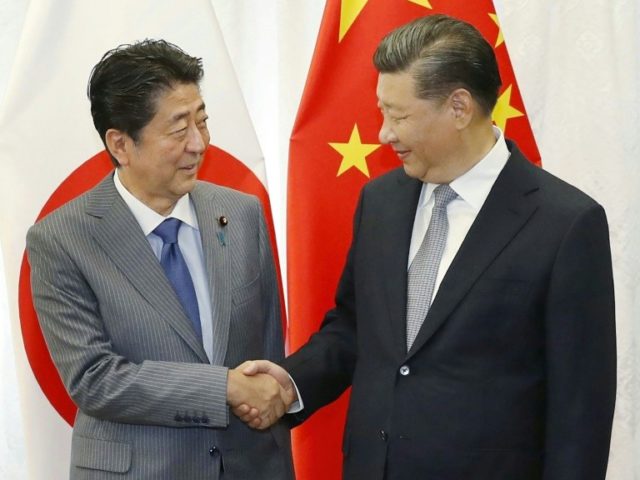Japanese Prime Minister Shinzo Abe met with Chinese President Xi Jinping in Beijing on Friday and agreed to strengthen bilateral relations.
“We confirmed that we are cooperative partners and absolutely do not pose a threat to each other,” Abe said after the meeting.
“We would like to join hands with China in contributing to peace and stability in the world,” Abe declared. “Relations between our two countries will be put back on the right track. We agreed to promote free trade.”
“Bilateral relations have been put back on the right track and positive moves are gaining momentum,” Xi responded.
Japan’s Mainichi said the meeting did not appear to settle lingering issues such as the dispute over the Senkaku Islands claimed by both China and Japan, Japan’s continuing support for Taiwan, and China’s theft of intellectual property. Nevertheless, Xi made progress in his quest to “get Japan on-side as Beijing contends with a trade war with the United States.”
A few concrete steps in that direction were discussed:
Pointing out that Japan-China relations are moving into a new dimension following China’s economic growth, Abe asked Beijing for cooperation on investing in infrastructure in third countries. Meanwhile, Premier Li apparently asked Abe to actively extend Japanese cooperation for the One Belt One Road initiative, promoted by Beijing as a new Silk Road spanning the Eurasian continent.
Abe and Li agreed to begin “innovation dialogue” on cutting-edge technologies and intellectual property rights, and to conclude an Agreement on Search and Rescue Regions (SAR). Tokyo and Beijing will set the upper limit on currency swaps, which the two countries will reintroduce after a five-year hiatus, at around 3 trillion yen.
With the United States leaning toward protectionism, the two premiers confirmed the importance of maintaining free trade. Abe and Li also agreed to move ahead with negotiations on a Regional Comprehensive Economic Partnership (RCEP), which the two countries and ASEAN are promoting, as well as a free trade agreement among Japan, China and South Korea.
The Wall Street Journal noted that Abe was “careful not to criticize Mr. Trump directly and echoed some of the U.S. president’s concerns about China’s state-led economic model when meeting Chinese President Xi Jinping.”
The Journal seemed a bit skeptical of Abe and Xi’s gushing praise for “free trade,” noting that both countries have employed protectionist measures and state control of the economy for decades. Whatever their past history on trade might be, China clearly needs allies in its trade war against the United States, and Japan could use more leverage with the U.S. in trade talks.
A somewhat uncomfortable moment came during Abe’s visit when the Japanese prime minister met with Chinese Premier Li Keqiang and voiced Japan’s objections to China’s treatment of the Muslim Uighur minority in Xinjiang province. Li’s response to this criticism was not made public.
During Abe’s visit, China’s state-run Global Times interviewed Takeo Donoue, director of the Japan External Trade Organization (JETRO).
Donoue was optimistic about improving relations between Japan and China, challenging the accuracy of media reports that Japanese companies are considering moving their Chinese operations to other locations in Southeast Asia.
He also said Japan’s opposition to China’s massive Belt and Road (BRI) infrastructure project has softened. Japan has been seen as working to organize an alternative to Belt and Road that would undercut China’s regional ambitions in partnership with the United States and Europe, but Donoue said Japan merely “did not understand” BRI until recent and wishes to “learn more about it.”
Donoue likewise expressed a willingness to look past Chinese theft of intellectual property by granting that some Chinese companies don’t understand the value of “long-term cooperative relationships,” so they seek to acquire technologies that Japanese companies are reluctant to sell outright.

COMMENTS
Please let us know if you're having issues with commenting.